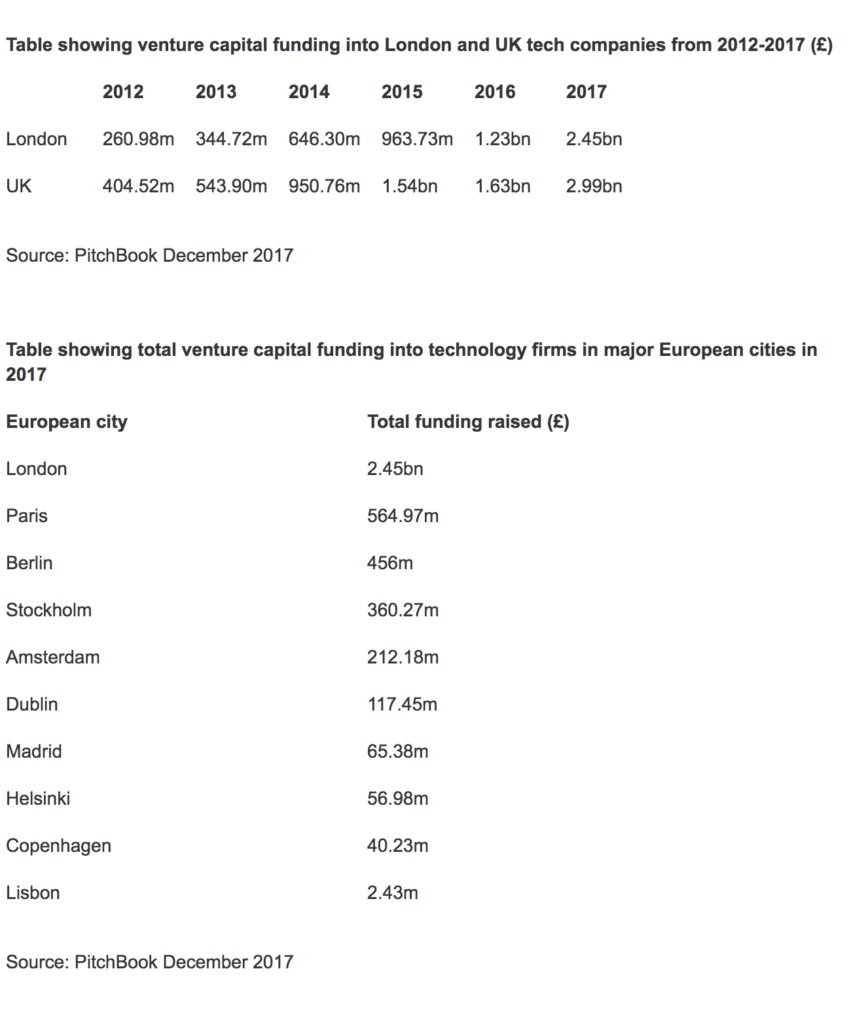The beginning of London Tech Week saw two great announcements for the UK tech sector. First came the Prime Minister’s announcement that technology firms – including US cloud computing firm Salesforce, UAE sovereign wealth fund Mubadala and Japanese IT services firm NTT Data – will be investing over £2 billion into UK tech companies, with this likely to increase to £5 billion in the next five years.
The Government-hosted roundtable also saw the launch of two “tech hubs” in Brazil and South Africa, to build innovative partnerships and develop skills, capability and business networks in those markets. The second positive news came from the Mayor of London’s promotional agency London and Partners who announced that UK tech had attracted more foreign investment since the Brexit referendum than Germany, France and Sweden combined. Totalling a staggering £5 billion in VC funding, the report also revealed that over £874 million of VC finance had been secured by UK tech so far in 2018.
Risk level should be right
As we have seen across a multitude of successful case studies that have emerged from the startup arena in the UK, there is no exact science or one affirmed route as to how to succeed as a growing UK fintech. Whereas in cases like that of Monzo or Revolut we are seeing phenomenal funding numbers, it is important to note that such a huge level of finance needs to be invested against the right level of risk, managing the wider infrastructure within the company that rests on such pivotal investment decisions. While over 1,600 jobs have been created as a result of the government’s recent announcements, we must make sure that we focus on nurturing long-term employment opportunities to bolster the growth seen thus far. What’s key to this is ensuring the investment infrastructure underpinning long-term security protects the people that are directly involved with the industry, just as much as it does the investors backing it.
See more:
Interview with Simon Rogerson and Chris Hulatt of Octopus Group
How angel investors support UK start-ups
The essential guide to raising private equity
Investors operating within the alternative investment arena, who do work to create steady and sustained growth within the companies they invest in, have consistently maintained a firm and optimistic perspective on both pre-and post-Brexit investment agendas. Many SME leaders’, however, have adopted a more pragmatic approach to the realities of the day. While both of these approaches accurately reflect the UK market’s preparation process for Brexit, the discord should also be seen as an opportunity for leaders on both sides of the investment spectrum to develop a symbiotic relationship.
In order to leverage the growth in opportunities, investors—particularly those in the alternative investment space—must transfer their optimism to SME business leaders. With this infrastructure in place, ensuring sustainable businesses are built becomes an easier task.
VC Funding in the UK and Europe
Foreign investment shows confidence in UK business
That the UK manages to attract such a high amount of foreign direct investment is a clear testament to what a hotbed of great minds and ideas the UK currently is. With phenomenal statistics coming out from some of the UK’s leading start-ups and scale-ups, there is a clear requirement for greater access to alternative finance to continue powering the companies that form the backbone of the economy. Whether it is via large VC raises – such as those pursued by the likes of Monzo or Revolut – or through highly successful funding paths combining private investment and crowdfunding – such as WeSwap – there are multiple routes to financial success. The successful route to finance for any growing company is as diverse as the nature of the company itself. SME leaders need to understand their own business – from their team and resources to where it is headed and future expansion – in order to utilise the correct finance. As an industry there is a requirement that business leaders are fully educated in the finance options available to them, and that investors are visible at all times to all parties.
Luke Davis is the CEO and founder of private equity firm IW Capital








